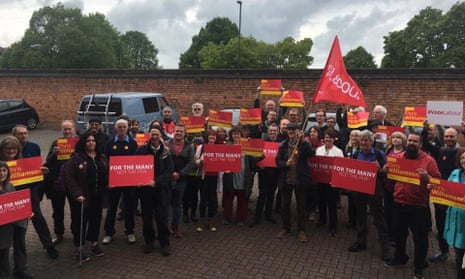Long ago I remember reading In Place of Fear, by Nye Bevan. I’m reminded of it now, as I return to parliament as MP for Derby North for the second time, after two years of absence. Bevan, the Welsh Labour politician who oversaw the creation of the NHS, describes the House of Commons as a range of mountains dominated by statues of old statesmen. Those stony eyes, the church-like stained glass and the echoing halls are all meant to cow a politician from humble origins, Bevan said, reminding us that the people Labour politicians are elected to represent hail from the other side of history – not the one represented by those statues.
My job in Westminster is not to speak for the fat cats. The debt I owe for the privilege of being an MP is to the ordinary constituents who elected me. That starts with the countless voters who throughout the campaign told me “You’re all the same” – but who, come polling day, had changed their minds.
In particular I owe a debt of gratitude to Momentum, the movement that grew out of Jeremy Corbyn’s original leadership campaign. It was Momentum that helped Labour to win back Derby North, demonstrating a model that should be followed elsewhere.
During an intensive ground campaign, the data we received from the doorsteps told us that the result was going to be very close. In 2015 I lost the seat to the Tories by just 41 votes, making Derby North the most marginal seat in England. In the end we won a majority of 2,015, a swing that was slightly higher than the national average.
The real success, however, was for Labour to make a gain in the region in which the party suffered its heaviest losses. For the first time in their long histories, the Brexit-voting constituencies of Mansfield and Stoke-on-Trent South went Tory, as did Walsall North and North East Derbyshire. A win in the Midlands should be of interest to anyone with an eye on the potential for a Labour majority.
After I had declared myself a pro-Corbyn candidate – one of the few to do so at the start of the election – Momentum threw some weight behind my campaign, as the journalist Rachel Shabi wrote about in the Guardian. For the first time in a generation, Labour’s commonsense manifesto meant the party had a clear offer that canvassers could make on the doorsteps, and in my constituency, with only 41 votes between Labour and the Tories, every conversation would count.
To my knowledge the party has made next to no effort to train up new canvassers from the now vast pool of potential activists in the membership. However, a training session held by Momentum in Derby North attracted more than 100 new recruits. The upbeat workshop represented something of a break from the party’s conventional method of doorstop data gathering. Instead, the training proposed a short encounter with undecided voters based on empathising with their concerns, before offering the real solutions set out in our manifesto.
Momentum also picked up the slack in Labour’s online campaigning. At the national level, a single video produced by Momentum reached 17 million Facebook users. At the start of the campaign, the party hastily rolled out Promote, an online tool meant to allow Labour’s candidates to augment their online presence. The software is very much a work in progress, but it required each candidate to have someone in their team experienced with everything from graphic design to digital marketing – and most don’t. Fortunately, two Momentum activists who cut their digital teeth on Corbyn’s second leadership election stepped in, lending Derby North the most dynamic social media campaign out of any single parliamentary candidate.
The election showed that Corbyn’s new kind of politics is in tune with a mass of younger voters whose opportunities and life standards will be worse than that of their parent’s generation, and for whom left/right distinctions are almost meaningless. Likewise, for older voters who saw New Labour as a betrayal of their values, Corbyn represents a return to the party’s authentic, fighting spirit.
Momentum enabled a symbiotic relationship between these two groups: the youthful spirit of hope helping to ignite older passions of struggle. The movement has helped Labour to forge a mass constituency far in excess of the trade unions, but still with socialist values firmly at its core: something the architects of New Labour thought impossible.
Bevan wrote that life in Westminster “contrasts depressingly with the crowded meetings and the clang and clash of hot opinion that [the new MP] has left behind in his election campaign”. For the party in opposition, the task should be to work with the flow of the crowds attracted to Corbynism, and to nurture that clang and clash of opinion that Momentum represents.









